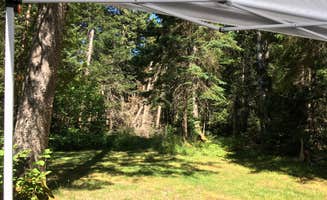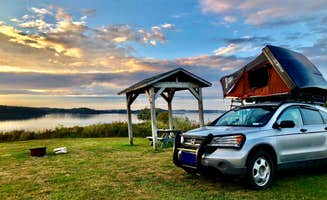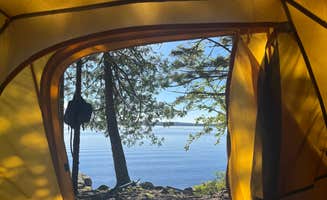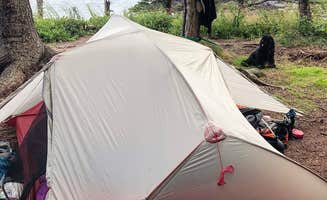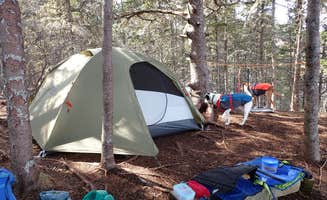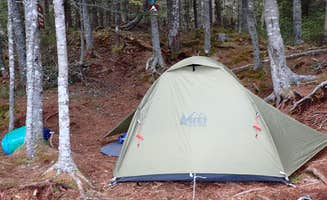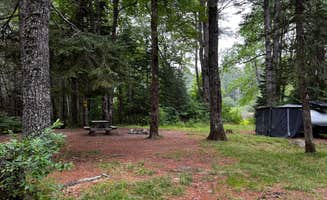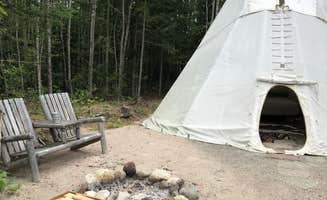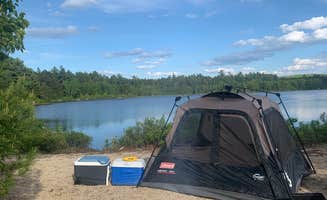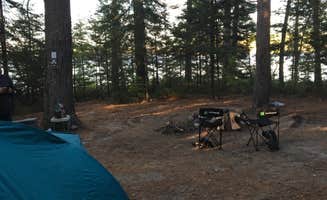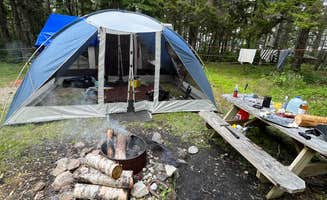Camping sites near Pembroke, Maine span both the state-managed lands and private options along Maine's easternmost coastline, where the tidal range can reach up to 24 feet. This northeastern region sits adjacent to Passamaquoddy Bay and the Bay of Fundy, creating unique paddling conditions that require careful planning around powerful tidal currents. Winter temperatures regularly drop below freezing from November through March, making most camping areas functionally inaccessible during these months.
What to do
Kayaking with tidal awareness: At Cobscook Bay State Park Campground, the dramatic tides require research before launching. "Kayaking should be done with prior research to ensure familiarity with the tide changes (which are up to 20 ft) and currents, which are strong and dangerous in certain areas of Cobscook Bay. There is a great map published by Cobscook Shores that shows recommended kayak areas and tide access," notes camper Heather C.
Lighthouse exploration: Quoddy Head State Park, about 25 miles from Pembroke, offers lighthouse viewing and coastal trails. A visitor to Sunset Point RV Park shared, "Nearby is Quoddy Head State Park which has some beautiful oceanfront hiking trails and a picturesque lighthouse." Crossing to Campobello Island (passport required) provides access to additional lighthouses.
Wildlife viewing: The rocky coastline hosts diverse marine wildlife. "We saw many seals and cormorants in the water, as well as a few eagles. You can launch a kayak from your campsite, or from the large dock/boat launch area in the park," reports a Cobscook Bay camper. Moosehorn National Wildlife Refuge nearby offers additional bird watching opportunities.
What campers like
Stargazing conditions: The limited light pollution creates exceptional night viewing. "Such an awesome view of the night sky oh my gosh. I could stare at it forever. We could see the milky way," notes a visitor at Cutler Coast Public Land. The coastal areas provide open vistas for astronomical observation.
Waterfront site privacy: Many campsites offer seclusion despite being near water. "The park is big, and many sites are very far apart - we had almost complete privacy. The majority of the tent sites and small rv sites, and some larger rv sites, are on the water," shares a Cobscook Bay visitor. Tent sites often provide more space than RV areas.
Freshwater swimming options: While ocean temperatures remain cold year-round, inland lakes offer swimming opportunities. At Keenes Lake Family Campground, one camper noted, "The lake was clean and we swam, kayaked and crossed the lake on paddle boards. The campground is small with limited sites, but I would gladly return."
What you should know
Primitive toilets at backcountry sites: Facilities at remote locations are minimal. A Cutler Coast camper reported, "Sites also have very rudimentary privies but these are not pit toilets, far from it. They are quite pathetic and gross consisting of a toilet seat sitting on a wooden frame, caged in by hardware wire."
Limited cell service: Connectivity varies widely across the region. Many campgrounds have spotty coverage, though some offer WiFi near office areas. "WiFi at our site (#16) was pretty poor but worked very well near the office/laundry. We had a strong Verizon signal so we didn't rely on their WiFi," notes a camper at Sunset Point RV Park.
Last provisions stop: "Machias is the last town with large stores before you get to the park and it's about 35 minutes away. There are some gas stations closer to the park," advises a visitor to Seaview Campground. Stock up on supplies before reaching campgrounds as options become limited.
Tips for camping with families
Playground availability: Some campgrounds offer dedicated play areas for children. A Cobscook Bay visitor mentioned, "There are a few open areas for picnicking or just relaxing, as well as a play area for kids. There are a few nice, relatively short and easy hiking trails that run through the park."
Beginner-friendly hiking trails: Several locations feature accessible trails suitable for children. "The 'Nature Trail' takes you along the water and into the woods. It's ideal for kids but still challenging in a couple areas as you make your way up to the gorgeous scenic overlook," reports a camper at Cobscook Bay.
Fresh water availability: Water access varies significantly between sites. At Huckins Beach and Trail, "There is a centrally located hand pump water spigot and two port-a-potties near the parking lot." Some primitive sites require carrying all water, while others have nearby pumps or spigots.
Tips from RVers
Site limitations for larger rigs: Many campgrounds in the region have size restrictions. "Very limited RV sites and very limited for over 20 feet," warns a Cutler Coast visitor. Research maximum lengths before arrival, especially for State Park facilities.
Generator restrictions: Several campgrounds prohibit generator use. At Cobscook Bay State Park, "There is no water/electric/power at any site. There are water stations around the park, as well as a bath house and dump station," notes a reviewer.
Pull-in strategies for views: Some RV sites can be approached differently for better scenery. "Most motorhomes (in sites 16-29) choose to pull-in forward so they have a water view out of their front window and run the utilities under their RV to hook-up," explains a Sunset Point RV Park camper.


